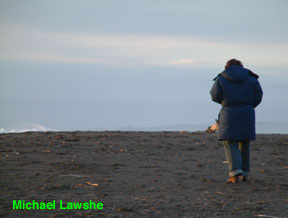Today is Rachel Carson's birthday - a time to reinvigorate the challenge she posed to all Americans.
We are part of the environment in which we live. The health of our air, soil and water is just as important to humans as it is to bald eagles, island foxes (video), humpback whales and monarch butterflies.
Rachel Carson's early books celebrated the sea, coastal habitats and the variety of interdependent life in the ocean: Under the Sea Wind; The Sea Around Us; Edge of the Sea. Through her study of coastal habitats and in her work as a writer for the Bureau of Fisheries and eventually the Editor-in-Chief of publications for the U.S. Fish and Wildlife Service, Carson saw what most Americans did not have access to: scientific reports on the toxic impacts of overused pesticides.
Carson was not a political person, she believed that science fact
crossed political lines. In the years following the publication of Silent Spring, the Clean Air
Act (1963), Clean Water Act (1972) and the Endangered Species Act (1973)
were enacted by Democratic and Republican administrations.
New science facts have been laid before us all: our use of fossil fuels in altering the global climate. Will we come together and act for the benefit of all humanity or let the well-financed voice of a few subjugate us into self-destructive inaction?
Your life is already too busy to take on a topic that seems insurmountable? Like all of us, Rachel Carson had personal responsibilities that consumed her everyday life. From the time she was a graduate student during the Great Depression, until the day she died, she was the sole financial support for her parents, her sister, her nieces and her grandnephew. She worked a full-time job and was the head of a household, while writing her first two books. She suffered from a variety of illnesses, including breast cancer that would take her life only two years after the publication of Silent Spring. She was determined not to let the world she loved be destroyed for future generations, are you?
In Silent Spring, Carson took scientific information to the
American people and challenged us to be engaged as advocates for our
local environments, to question short-term commercial gain that
disregards long-term damage to life forms and habitats, and to demand
accountability of our government officials, from local representatives
to the President.
If we all did these three things, we could change the future in a positive way.
More on Rachel Carson.



No comments:
Post a Comment